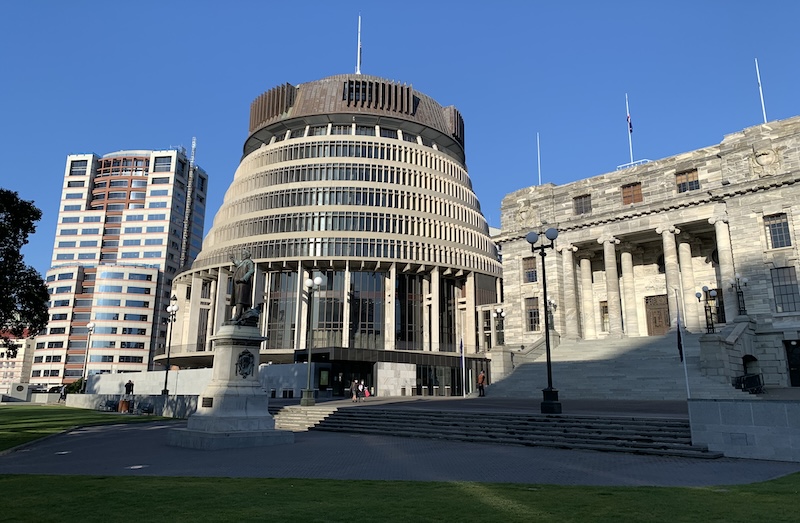The leader of the nation’s largest federal employee union had a blunt message for labor officials across the country at the opening of the American Federation of Government Employees’ legislative conference Monday: your jobs—and democracy itself—may be at stake.
“This year, everything is on the line,” said AFGE National President Everett Kelley. “Every gain we have won, every value we hold dear, every aspect of our democracy, and, yes, the very survival of our great union: it’s all on the line, brothers and sisters. But I am not here to preach doom and gloom today. I come with good news: AFGE members have the spirit …to meet this challenge head-on.”
With the former president’s path to the Republican presidential nomination seeming all but inevitable, nearly every labor official and Democratic lawmaker who spoke at the opening session of an annual event — in which union members from across the country travel to Washington to meet with lawmakers and advocate on behalf of their coworkers in the federal workforce — lambasted Donald Trump’s policies governing the federal workforce and the nonpartisan civil service.
Speaking with reporters after the session, Kelley said a second Trump administration would represent an existential threat to AFGE and other federal sector labor unions.
“The first priority for this union [this year] is to elect a president that is sensitive to the issues that federal employees face, and we know who that is because we know who stepped up to the plate for federal employees, and it was President Biden and Vice President Harris,” Kelley said. “They stepped up and sent us a lifeline when we were on our deathbed. The previous administration was trying to kill us, and I believe that [if they had] two more months, we might have been dead. We just couldn’t take it anymore.”
In 2018, then-President Trump signed a trio of executive orders aimed at making it easier to fire federal workers, as well as instituting an array of restrictions to collective bargaining, including reducing the scope of what management must negotiate with labor over, and severely restricting union officials’ access to official time.
And in fall 2020, he authorized the creation of Schedule F, a plan to reclassify federal employees in “policy-related” jobs out of the competitive service, making it much easier to hire or fire individuals in these positions. Though the plan could have stripped tens of thousands of career bureaucrats of their civil service protections and effectively made them at-will employees, agencies ultimately were unable to implement Schedule F before President Biden’s inauguration, at which point he rescinded the executive order authorizing it.
On the campaign trail, Trump has repeatedly advocated for the revival of Schedule F, and conservative activists have been working behind the scenes to enable its swift implementation at the start of the next Republican administration. Ex-White House staffers have compiled a list of 50,000 current federal workers who could be threatened with removal upon their conversion to Schedule F.
Meanwhile, a coalition of conservative groups, led by the Heritage Foundation, has banded together to create Project 2025, a Republican presidential transition project that seeks to create a database of upwards of 20,000 political appointees to fill roles at federal agencies—well above the roughly 4,000 political appointments currently in the federal government.
Democratic officials on Monday routinely connected Trump’s plans for the federal workforce with broader undemocratic themes of Trump’s 2024 campaign. In recent months, Trump has espoused the idea of acting as a “dictator” for “one day” as well as arguing in court—so far unsuccessfully—that presidents should have “absolute immunity” legally stemming from all conduct while holding office.
“Our merit-based civil service system is one of the central assets to protecting democracy in America,” said Sen. Chris Van Hollen, D-Md. “It’s part of what distinguishes our system and our country from authoritarian regimes around the world. In authoritarian regimes, it’s all about patronage and loyalty not to one country, but to one person…As we hear the former president threaten to ‘purge’—his word, not mine—the federal workforce if reelected, it’s a good reminder of how far we’ve come in the past few years.”
Appearing for the first time at AFGE’s conference was a fellow labor leader: National Treasury Employees Union National President Doreen Greenwald. Kelley will in turn speak at NTEU’s legislative conference later this month, and he said the collaboration grew out of a personal friendship between the two officials.
“We all want a federal workforce that is strong, paid fairly and has the necessary resources so that you can successfully accomplish the work that you do,” Greenwald said. “This year, we’re facing the same threats: threats to our jobs, to our collective bargaining rights, and to our unions. Individually, each of our unions is a powerhouse, but think of what we can accomplish together.”
Kelley said federal employee unions are working more closely together, given both their shared policy interests and what they see as the threat to the employees they represent.
“It’s my humble opinion, and Doreen’s as well, that Donald Trump is just bad for federal employees,” he said. “Our attempt is to educate as many members as we can about the effects of a Donald Trump administration. He hasn’t been good for feds, and we know he won’t be [if he is elected again]. We have to do more educating and talking with the grassroots people on the ground, so they know what they’re facing with the Trump administration. That’s what we’re trying to do, collectively.”





















Discussion about this post